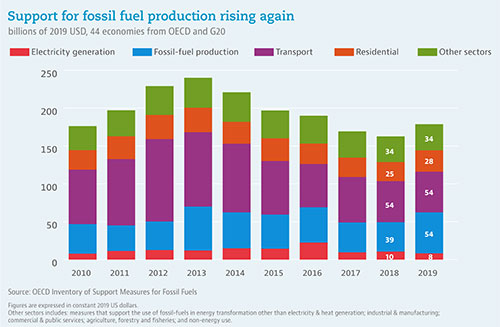The move to sustainable energy should be accelerated as a positive outcome of global lockdowns says report

The world’s governments should seize an opportunity to pull back support for the fossil fuels sector and make sustainable investments.
That’s the call from a joint report from the OECD and the International Energy Agency (IEA) which says that historically-low oil prices should be used as a catalyst for investment in low-carbon energy.
The move away from fossil fuels is gathering pace among investors and the investment industry with more funds pledging to avoid the most polluting companies and sectors.
Desjardins announced over the weekend that all 17 of its SocieTerra Funds and Portfolios are now 100% free of oil production and pipeline holdings, reducing the exposure of these investment products to fossil fuel producers and specialized transporters from 5% to 0%.
That means that the funds and portfolios have no shares in any firm that derives a significant proportion of their revenue from extracting or producing oil, natural gas or thermal coal, or from specialized oil and gas transportation (including pipelines), oil refining or coal-based energy production.
"We're committed to completely divesting from the thermal coal industry by the end of the year and supporting our partners who have a serious transition plan ready to go that's in line with Intergovernmental Panel on Climate Change (IPCC) recommendations,” explained Guy Cormier, President and CEO of Desjardins Group. “And since tobacco and vaping products harm both consumer health and the environment, we're eliminating our holdings in that industry as well.”
A recent report showed that global institutional investors are willing to leverage their strength to make the world a better place.
Stop the backsliding
The OECD and IEA report highlights that government support for the production and consumption of fossil fuels totalled US$478 billion in 2019.
While end-user subsidies were lower in 2019 than in 2018, the report found a 38% rise in direct and indirect support for the production of fossil fuels across 44 advanced and emerging economies.
“I am saddened to see some backsliding on efforts to phase out fossil fuel support. This rise in production subsidies seems set to continue in 2020 with some countries targeting state aid to fossil fuel and related industries,” said OECD Secretary-General Angel Gurría. “Subsidising fossil fuels is an inefficient use of public money and serves to worsen greenhouse emissions and air pollution. While our foremost concern today must be to support economies and societies through the Covid-19 crisis, we should seize this opportunity to reform subsidies and use public funds in a way that best benefits people and the planet.”

Environmental gain from lockdowns
A study from the environmental group Global Footprint Network released last week, shows the benefit to the earth’s natural resources during the world’s pandemic lockdowns.
Its annual calculation of ‘Earth Overshoot Day’, the date when humanity has used all the biological resources that Earth can renew during the entire year, has been extended in 2020 by three weeks compared to 2019.
Even with the 9.3% reduction of humanity's ecological footprint, we will still reach Earth Overshoot Day on August 22. We currently use 60% more than can be renewed – as much as if we lived on 1.6 planets.
"Humanity has been united by the common experience of the pandemic and shown how intertwined our lives are. At the same time, we cannot ignore the deep unevenness of our experiences nor the social, economic, and political tensions which have been exacerbated by this global disaster," said Global Footprint Network CEO Laurel Hanscom. "Making regeneration central to our rebuilding and recovery efforts has the potential to address the imbalances both in human society and in our relationship with the Earth."



